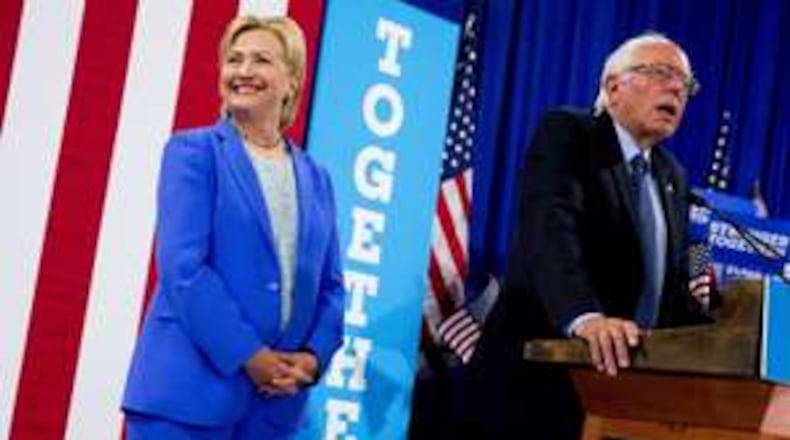Bernie Sanders endorsed Hillary Clinton this week, but not before she endorsed a key bit of Sandersism by proposing "free" college tuition for 8 in 10 American families.
Some people wondered why it took Sanders so long to announce his official support of Clinton. The answer always seemed clear to me: He wanted to maximize his leverage over the Democratic platform and, more important, Clinton's own agenda. For while Donald Trump struggles to unify the GOP, Clinton has faced her own challenges in winning over Sanders' loyalists, particularly millennials.
Looks like Sanders' approach worked.
The draft of the platform is as left-wing as it has been in some time . It incorporates Sanders' bid to raise the national minimum wage to $15 an hour (even Clinton has resisted going quite so high everywhere) and it lurches even further away from the center on issues ranging from business regulation to the death penalty to the Second Amendment.
Clinton's reputation as a moderate was always overblown, and as she fought to put down the Sanders insurgency she also crippled what little reason voters still had to believe she was any kind of centrist. Joining the Vermont socialist in wanting to dump college tuition costs onto taxpayers is just the latest blow.
There is no such thing as "free" tuition. Someone pays for it. Here in Georgia, public-college tuition was "free" for students with a "B" average -- so long as they didn't buy the lottery tickets that actually paid the bills. Even that tuition bill represented only a portion of the cost of their attending college; taxpayers picked up the rest of the tab, via the annual appropriation to the Board of Regents.
All of that state funding is on top of Pell Grants and other federal programs that already total $150 billion a year . That sum is spread among 13 million students, meaning U.S. taxpayers already subsidize roughly two-thirds of U.S. post-secondary students to the tune of $11,500 per year per recipient on average. And again, that is beyond what states and private sources add.
Yet, despite all that spending, college is widely considered to be less affordable than ever. Or maybe I should say, because of all that spending.
The price of something doesn't go down just because someone else starts paying for it. On the contrary, it tends to go up when that happens. What are three of the consumer expenditures whose price increases have most sharply outpaced general inflation? Higher education, health care and housing. What are three of the consumer expenditures most heavily subsidized by taxpayers? Higher education, health care and housing.
Right now, what little downward pressure there is on tuition exists because students and their families have to save or borrow to pay some of the costs. Take away that need to chip in some of the costs and incentive to be even somewhat frugal, and the collective bill will only climb.
Say goodbye to loan payments for your own tuition until it's paid off, and hello to paying taxes for everyone's tuition until, well, you die.
What's more, declaring public college tuition to be "free" will only put more of a premium on private colleges, putting them even more out of reach for the average student. We'll have a two-track system that resembles the one we have for those with private health insurance and those stuck trying to find a doctor who will accept Medicaid.
Call it Educaid, the closest thing to a new idea the presumptive Democratic nominee has in this election.
About the Author
The Latest
Featured



